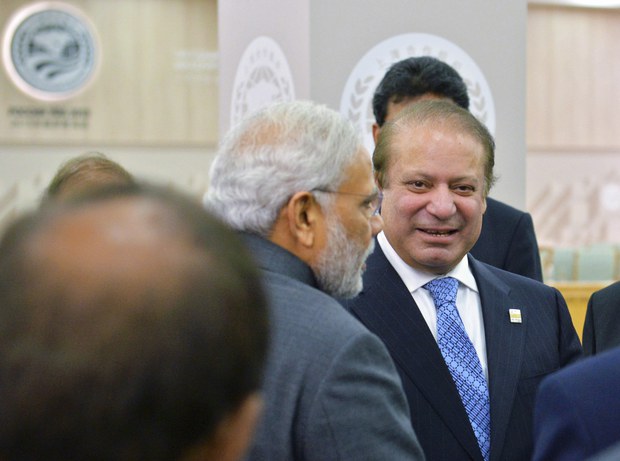India, Pakistan Agree to De-escalate Cross-border Violence
2015.07.10
 Indian Prime Minister Narendra Modi (left) talks with Pakistani Prime Minister Nawaz Sharif following the Shanghai Cooperation Organization summit in Ufa, Russia, July 10, 2015.
Indian Prime Minister Narendra Modi (left) talks with Pakistani Prime Minister Nawaz Sharif following the Shanghai Cooperation Organization summit in Ufa, Russia, July 10, 2015.
India and Pakistan on Friday agreed to tackle terrorism and hold frequent bilateral meetings between their senior army officers aimed at easing border tensions in Jammu and Kashmir.
The announcement through a joint statement came after Prime Minister Narendra Modi and his Pakistani counterpart, Nawaz Sharif, met on the sidelines of the Shanghai Cooperation Organization (SCO) summit in Ufa, Russia.
Russian President Vladimir Putin opened the meeting by announcing India and Pakistan’s entry into the China-led security bloc as new permanent members, according to news reports.
Modi also accepted an invitation to visit the neighboring country in order to attend next year’s SAARC (South Asian Association for Regional Cooperation) Summit, which Pakistan will host. The trip will be Modi’s first visit to Pakistan since he took office in May last year.
But questions remain as to whether the latest gesture could lead to a significant breakthrough in bilateral relations, given the two countries’ implacable hostility over Kashmir. Pakistan and Indian both have territorial claims on Kashmir and have fought three wars over the Himalayan region since 1947.
In recent weeks, escalating cross-border violence in Jammu and Kashmir has further strained relations between the two nuclear-armed countries.
Welcome move
Nonetheless, Analysts welcomed the moves announced in Russia, stressing there was no alternative to continued dialogue between India and Pakistan.
“Cross-border terrorism or ceasefire violations along their borders pose a great threat to the security of both countries,” Imtiyaz Ahmad, former Professor at Jawahar Lal Nehru University in Delhi, told BenarNews.
“I think it is a good move, which if implemented on the ground will give a respite, especially to the residents living amid fear and uncertainty near the borders,” he added.
A meeting of the two leaders is a must for reducing tension in the region, according to Noor Mohammad Baba, a professor political science at Kashmir University.
“Now that they have agreed to discuss some important issues like ceasefire violations and terrorism, it is hoped that a conducive atmosphere to discuss Kashmir issue will be created in due course,” he told BenarNews.
The decision to hold frequent meetings between senior army officers of the two countries at border posts should put a check on ceasefire violations and bring much needed relief to people living along the frontier, he said.
In the past, the Indian and Pakistani leaders were restricted to a weekly conversation via a hotline.
Iqbal Ahmad Doi, 27, a college student and resident of Tanghdar, a border town in Kashmir’s Kupwara district, hailed the news out of Russia.
“Two deadly gun battles between government forces and militants rattled this town in the recent past,” he told BenarNews.
“We have been living amid great insecurity due to ceasefire violations at regular intervals. Now that the two nations have agreed to discuss the violations, we hope they will make serious efforts to restore order at the borders,” he said.







